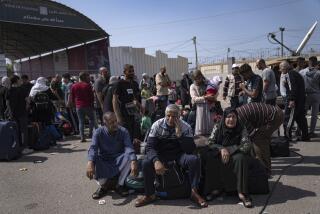Mubarak Rallies Arab Support : Cairo: The Egyptian president not only sides with the U.S. but has sent emissaries to Damascus, Tripoli and other capitals to get their backing.
- Share via
CAIRO — Although he had initial misgivings about the deployment of U.S. forces to Saudi Arabia, Egyptian President Hosni Mubarak has emerged in recent weeks as the most vocal and stalwart Arab supporter of the U.S.-led alliance waging war against Iraq.
Besides committing more than 35,000 of its best troops to the war effort, Egypt has taken the lead in holding the Arab component of the alliance together in the face of Iraqi efforts to split it.
Egyptian emissaries have been shuttling to Damascus, Tripoli and other Arab capitals, alternately “cajoling or threatening other countries to support the coalition or, at least, to refrain from giving an assistance to Iraq,” one diplomat said.
“The message they seem to be conveying is that the allies are going to win this war, Egypt and Saudi Arabia will be calling the shots in the region after that and they will know how to reward friends or punish foes,” another envoy added.
There are reportedly some in Egypt’s ruling circles who support Mubarak but still feel uncomfortable with his aggressive, high-profile stand. No one doubts that Iraq will be defeated, but some senior officials apparently see postwar risks for Egypt if Mubarak is perceived as being too closely tied to the United States.
“This crisis, in one sense, has been a godsend for Mubarak because it drew peoples’ attention away from the fact that his almost blind faith in the Americans to bring the Israelis to the Middle East peace table had been misplaced,” one senior diplomat said.
“Mubarak was coming under a lot of quiet criticism then. Now everyone supports him. But, with anti-American sentiment likely to rise in the region, there are those who think his interests would be better served by not seeming to be so dependent on Washington,” the diplomat added.
Mubarak clearly seemed to have shared at least some of these reservations at the outset of the Persian Gulf crisis. But he just as clearly has brushed them aside in the buildup to the U.S.-led attack on Iraq on Jan. 17.
“The president is very proud of himself at the moment. This is his show, and he is making the decisions and giving the orders,” one official said. Noting that Mubarak is a former air force commander, the official said the Egyptian leader feels confident because the air war now being conducted against Iraq “is his area of expertise.”
The president, he added, “has finally graduated from the tutelage of his advisers.”
The main reason for Egypt’s active role in the coalition is simple, officials say. Mubarak, and indeed nearly all Egyptians, share the world’s outrage at the Iraqi invasion of Kuwait and, despite Egypt’s formerly close ties to Iraq, have grimly concluded that Iraqi President Saddam Hussein poses a grave threat to the established order of the region and must therefore be stopped.
But some officials also see other benefits for Egypt. One is already apparent in the decision by Western nations to waive a third of Egypt’s debts. The United States earlier had agreed to forgive $7 billion in military debts. Together with pledges of additional aid from Saudi Arabia, the moves by Egypt’s creditors will help offset the loss of worker remittances and tourism revenues on which its feeble economy depends.
Another benefit is the certain boost the crisis gives to Egypt’s struggling efforts to reclaim the leading role it once played in the region before it broke Arab ranks to sign its 1979 peace treaty with Israel. Many Egyptians had expected that role to be conferred on them when Cairo was readmitted to the Arab League two years ago.
But, beset by growing economic troubles and overshadowed by Iraq’s daunting military might, Egypt soon discovered that it could no longer quite fill the shoes it wore for the nearly three decades leading up to the October, 1973, war with Israel.
However, as the region begins to rearrange itself in anticipation of an Iraqi defeat, it is clear that the new postwar Arab order will be dominated by a revival, albeit in a more benign form, of the Egyptian-Saudi-Syrian axis that shaped its politics in the early 1970s.
“It is the only way the pieces of the puzzle can fit back together,” a Western diplomat said. “Wedding Saudi money to Egyptian manpower is the perfect marriage of convenience.”
That Egypt should take the lead in waging the coalition’s diplomatic offensive in the Arab world is only logical, officials say. Syria cannot do it because it is still too deeply mistrusted. Although for obvious reasons the key Arab member of the coalition, Saudi Arabia also cannot do it because it is preoccupied with actually fighting the war.
Egyptian officials also cite two other reasons for Mubarak’s determination in the current crisis. One is his personal pique at the Iraqi leader for deceiving and then insulting him.
Making no attempt to conceal that anger in a two-hour speech to Parliament last Thursday, Mubarak said Hussein had repeatedly assured him last summer that he would not invade Kuwait. Then, citing another example of the Iraqi leader’s duplicity, Mubarak said Hussein asked him after the invasion to convey his assurances to Washington that Iraq would not attack Israel.
Mubarak said the most recent communication he has received from Hussein was a 44-page letter on Dec. 29 that contained “not a single line that was free of insults, including personal insults.”
Finally, another factor bolstering Mubarak’s confidence has been the lack of significant opposition in Egypt to its alliance with the United States in the war against Iraq.
The Muslim Brotherhood has condemned both the occupation of Kuwait and the U.S.-led offensive. A small pro-Iraqi newspaper has gone further, calling on Egyptians to switch sides and fight the United States. And a small but apparently growing number of Islamic and leftist intellectuals are starting to voice support for what they see as a bold bid by Hussein to right decades of colonial wrongs by standing up to Israel and the United States.
Concerned that such sentiment might spread, the government has moved to preempt it by extending the midterm school break for two weeks and by closing Cairo’s soccer stadium, where crowds would otherwise have formed for games. It has also moved quickly to stock stores with plenty of food to ensure that “economic gripes don’t get mixed up with political ones and create a cocktail of trouble on the streets,” one Western diplomat said.
However, 11 days into the war, these precautions are beginning to seem unnecessary.
“So far, the only Egyptians criticizing Mubarak’s position are a few of the intellectual fringe groups,” said Ali Hillal Dessouki, a prominent Egyptian political scientist. “The mood on the street is much more supportive of the president in this because Egyptians know what Saddam Hussein is really like.”
Unlike the intellectuals, ordinary Egyptians have firsthand knowledge of Hussein. Hundreds of thousands of Egyptian farmers and laborers have been working in Iraq, and over the years many have come home with tales of terror--of how Egyptians have been murdered by Iraqis, forcibly conscripted into the army or beaten and robbed of their belongings as they tried to leave. This was going on long before Iraq invaded Kuwait, and it has had a powerful effect on how the current crisis is being perceived on the Egyptian streets, Dessouki and other analysts said.
Even an Islamic intellectual who counts himself among the president’s critics conceded as much. “The people are not with us yet,” he said. “But perhaps that will change if the war lasts a long time.”
More to Read
Sign up for Essential California
The most important California stories and recommendations in your inbox every morning.
You may occasionally receive promotional content from the Los Angeles Times.










